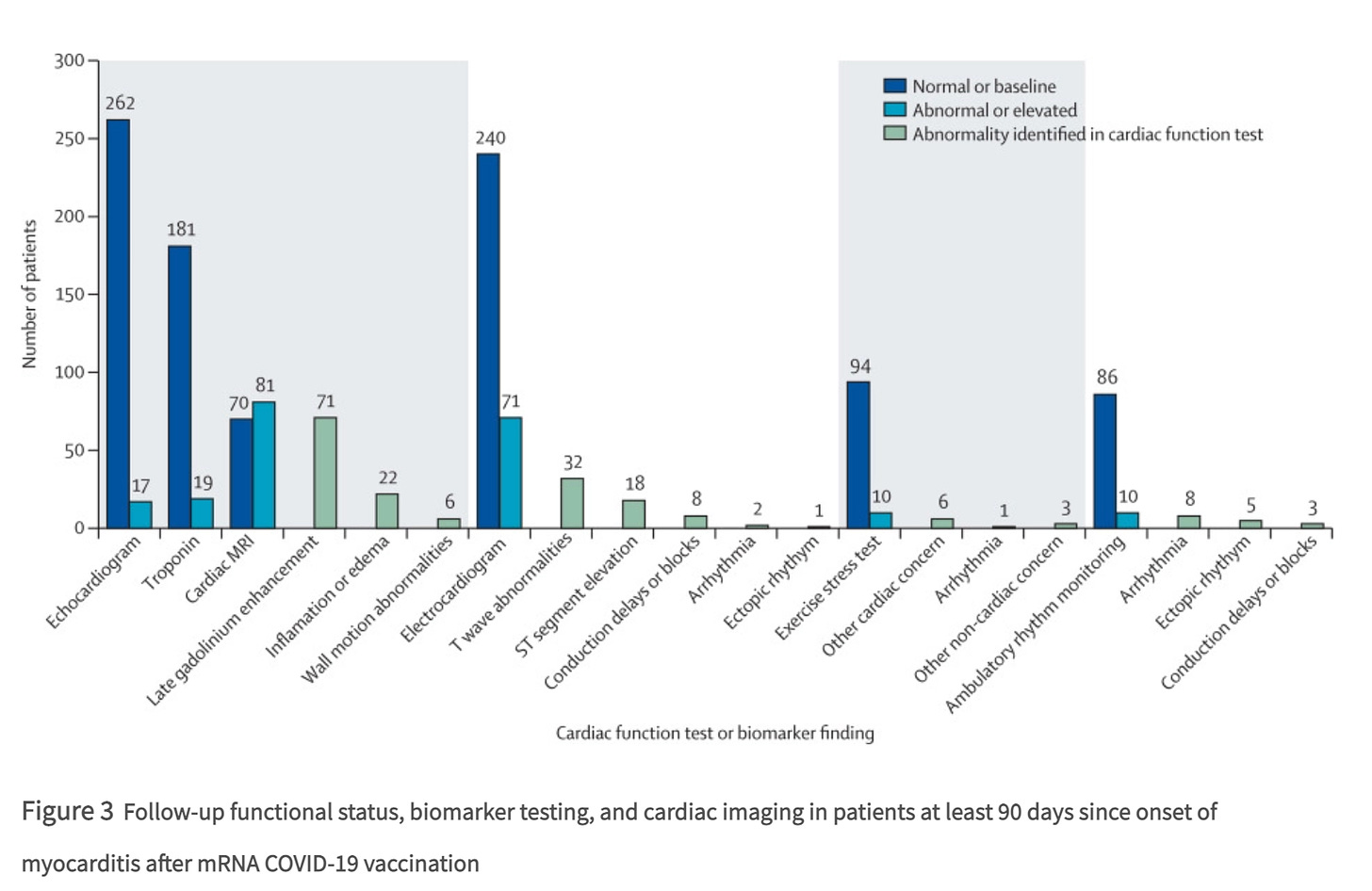Polska utraci wielkie bogactwa na rzecz Zachodu?
1. GNN: Poszczepienne choroby serca u młodych mężczyzn 12-29
Między 1 na 30 a 1 a 5000 mężczyzn 12-29 lat ma problemy z sercem po szczepieniu. Tutaj o badaniu młodych z poszczepiennymi chorobami serca wiecej niż 3 miesiące po pojawieniu się symptomów. Dramat.
The Lancet opublikował badanie retrospektywne przeprowadzone przez medyków z Uniwersytetu w Yale. Sprawdzano stan zdrowia chłopców i młodych mężczyzn 12-29 co najmniej 3 miesiące po zgłoszeniu się do szpitala z powodu zapalenia mięśnia sercowego lub osierdzia. Wnioski
26% było nadal na lekach związanych z chorobą.
Spośród tych, którzy wypełnili ankietę
- 2% wymagało pomocy w codziennym życiu
- 5% miało kłopoty z poruszaniem się,
- 20% z kontynuowaniem dotychczasowego stylu życia
- 30% doświadczało bólu
- 46% depresji.Jeden z badanych podczas początkowego leczenia był podłączony do płucoserca (ECMO) Tak wyglądają te lekkie zdaniem naszych medycznych orłów i urzędników przypadki poszczepiennych komplikacji.
Artykuł tutaj
Outcomes at least 90 days since onset of myocarditis after mRNA COVID-19 vaccination in adolescents and young adults in the USA: a follow-up surveillance study
Omówienie 1 Vinay Prasad
Omówienie 2. Robert Malone
Outcomes at least 90 days since onset of myocarditis after mRNA COVID-19 vaccination in adolescents and young adults in the USA: a follow-up surveillance study
https://www.thelancet.com/journals/lanchi/article/PIIS2352-4642(22)00244-9/fulltext?utm_source=substack&utm_medium=email#gr3
The Lancet, September 21, 2022
Findings
Between Aug 24, 2021, and Jan 12, 2022, we collected data for 519 (62%) of 836 eligible patients who were at least 90 days post-myocarditis onset:
126 patients via patient survey only, 162 patients via health-care provider survey only, and 231 patients via both surveys. Median patient age was 17 years (IQR 15–22); 457 (88%) patients were male and 61 (12%) were female. 320 (81%) of 393 patients with a health-care provider assessment were considered recovered from myocarditis by their health-care provider, although at the last health-care provider follow-up,
- 104 (26%) of 393 patients were prescribed daily medication related to myocarditis.
Of 249 individuals who completed the quality-of-life portion of the patient survey,
- four (2%) reported problems with self-care,
- 13 (5%) with mobility,
- 49 (20%) with performing usual activities,
- 74 (30%) with pain, and
- 114 (46%) with depression.
Most patients had improvements in cardiac diagnostic marker and testing data at follow-up, including normal or back-to-baseline troponin concentrations (181 [91%] of 200 patients with available data), echocardiograms (262 [94%] of 279 patients), electrocardiograms (240 [77%] of 311 patients), exercise stress testing (94 [90%] of 104 patients), and ambulatory rhythm monitoring (86 [90%] of 96 patients).
An abnormality was noted among 81 (54%) of 151 patients with follow-up cardiac MRI; however, evidence of myocarditis suggested by the presence of both late gadolinium enhancement and edema on cardiac MRI was 13% of 151 patients. As noted in the paper, there are no standard criteria for myocarditis recovery, and the authors did not identify any clinical feature or diagnostic test results associated with recovery status in the patients they evaluated.
What does this actually translate to?

When all is said and done, 90 days plus follow-up documented more than half of those participating in a VAERS database followup has an abnormal cardiac MRI and 30% had an abnormal electrocardiogram. The majority of participants did not receive a full work up -and so status is unknown for most of the tests listed.
This paper is highly artificial because it is not a true indicator of the risks and outcomes, as it is relying on the self-reporting VAERS system and then it is a survey type study only of those who have self or physician reported. Voluntary surveys data on top of voluntary self-reporting… Both of which survey designs are known for both skewing and reporting errors.
As noted in the paper, there are no standard criteria for myocarditis recovery, so these test results are to some extent, subjective.
However, even within these limitations, the data suggests that a large portion of young adults who developed myocarditis are not fully recovered at 3 months, if one accepts the abnormal cardiac MRI as criteria for not being fully recovered and if one abnormal electrocardiogram, about 30% are not fully recovered.
Heart muscle does not heal easily. Cardiac scar tissue does not dissipate easily.
The study spins these results as a kind of “good news” story. Personally, I find very little good news in these results. Nineteen percent of the patients were not considered recovered by their last follow-up with a health care provider. That is not good news.
Another example of the development and deployment of psy-ops and nudge technology during the COVIDcrisis involves messaging designed to address “vaccine hesitancy”. Even though the testing of the vaccine products were highly abbreviated and did not meet regulatory norms for either vaccines or genetic therapies, the development and clinical testing of psy-ops and nudge messaging were carefully performed using a prospective randomized, controlled clinical trial structure with short term, three and six month follow up.
Please keep in mind, these “vaccines” are unlicensed medical products available under Emergency Use Authorization. This Yale study is designed to entice and force uptake and acceptance of an unlicensed medical product without full informed consent. This is explicitly prohibited by modern international agreements concerning medical ethics.
2. Globalista: Polska utraci wielkie bogactwa na rzecz Zachodu?
https://www.youtube.com/watch?v=S61yHRvOLrw
3. Grzegorz Kusz: Katarzyna Szewczyk – Wielka Transformacja, czyli Dlaczego masz stracić cały majątek
https://www.youtube.com/watch?v=GO_RF0qj8dE

